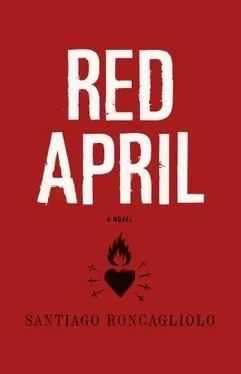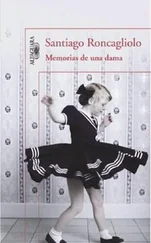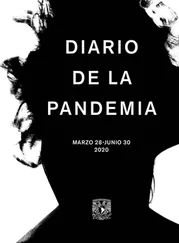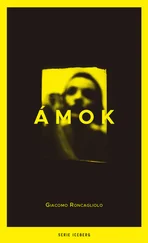Until he opened his eyes.
The bus had stopped. He looked at the time: four in the morning. He saw the fogged-over glass in the windows. He wiped his so he could look outside. Lashed by the wind, the rain fell horizontally. It was hailing. He noticed that the person sitting beside him had disappeared, along with a good number of other people. The lights were turned on and the bus was half empty, occupied only by women with sleep-crusted eyes. From the door, someone, perhaps the driver, was shouting:
“They said for all the men to get out! Only the men!”
The prosecutor did not understand what was going on. He tried to catch a glimpse of something in the darkness outside. The interior lights of the bus allowed him to make out only some hooded silhouettes and the projection of bayonets slung over their shoulders.
He had a rapid memory of the last time he had visited Ayacucho to see his mother before he came back to live there. It had been in the early eighties, when he was a recent appointee to the ministry. Before it reached the city, his bus had been stopped by a terrorist group that had asked all the passengers for their identification. The military men wearing civilian clothes ate their papers. The prosecutor also swallowed his identity card from the Ministry of Justice. The terrorists had taken all the electoral identification cards from the bus and then torn them up in front of the owners:
“You no longer have documents,” they shouted, “you can't vote, you're not citizens! Long Live the People's War! Long Live the Communist Party of Peru! Long Live President Gonzalo!”
They made everyone repeat their slogans and left after stealing the little the passengers had with them. They wore balaclavas and carried weapons. Like those who had stopped the bus now.
At the door, the driver called again for the men. Two others who had been asleep walked to the door, rubbing their eyes. The prosecutor wondered if he ought to swallow his identification as an election inspector. But the document was encased in plastic. It was impossible to chew. He hid it under his seat and stood up. He walked to the door. When he climbed down, a man in a black balaclava began to shove him and drag him to the line that the others were forming. The rain fell like a whip against his face. He verified with relief that the man pushing him wore the green uniform of the army. He tried to identify himself:
“I am Associate District Prosecutor Félix …!”
The other man responded with a shove. When his turn came, a sergeant faced him, also hidden behind his balaclava. Between the mask, the rain, the fear, and his dreadful Spanish, he could hardly be heard when he shouted:
“shhhhwmmmmyrccccrrrt!”
Accustomed to roundups, the prosecutor took out his national ID. The other man scrutinized it carefully and looked the functionary in the face. It was difficult to read the expression in his eyes. He returned the document and shouted again:
“shhhhwmmmmmyyrrrrccccrt!”
The prosecutor showed him his military identification. The other man nodded and returned it to him. The first man pushed him back to the bus. The prosecutor climbed in, feeling calmer, thinking that his safety was guaranteed day and night by the armed forces.
The bus started moving again and Félix Chacaltana Saldívar retrieved his election identification and went back to sleep. He woke in the light of dawn with the image of a river running down the slopes of the hill the vehicle was descending. As the rain clouds dispersed, the sky recovered its comforting brightness.
The bus stopped at seven in the morning. The prosecutor climbed down and picked up his suitcase from among the sacks of potatoes and cages of animals. There was no terminal. The bus had stopped only to drop him off. The town was two hours away. It was the same length of time until the public offices opened. The prosecutor was supposed to go to the National Office for Electoral Processes and to the National Police. He thought he would arrive in time to have breakfast. He walked along a dusty road, his baggage on his back. He crossed the river and two hills that turned out to be higher than they had seemed at first. He would stop periodically to make certain his suit was not wrinkling or becoming covered with dust.
Finally he reached a valley. In the distance he could see Yawarmayo. As he walked toward it, he thought he saw someone at the entrance to the village. He thought the appropriate authorities were waiting for him. He waved his hand. The person did not return his greeting. When he came to the edge of the village, no one was there. No business was open. No certainty that there was a single restaurant or a single person. Not even a piece of asphalt. Only streetlights in the distance, still on in spite of the daylight.
The streetlights seemed to be decorated with wreaths or some kind of colored decoration. He thought it was probably a remnant of Carnival or an ornament for Holy Week. He dusted off his trousers and readjusted the hanger with his suit, his file, and his sports bag. He continued walking.
Only when he stood at the foot of the streetlights could he see up close what hung from them. Dogs. Some strangled, others beheaded, some slit open, their internal organs dribbling from their bellies. He dropped the bag. A chill ran down his spine. The dogs wore signs that said: “This is how traitors die,” or “Death to turncoats.”
The prosecutor felt dizzy. He had to lean against a wall. He felt alone in the middle of the street where, he noticed again, no one else was walking this morning.
He was still there half an hour later. He had failed to find an open door. He did not know what to do, where to go. Until the first shadows appeared on the street. They belonged to police, walking heavily and carrying ladders to take down the dogs. They leaned their ladders against the streetlights and removed the animals following an established order, more bored than repelled, as if accustomed to a routine of canine corpses. Félix Chacaltana thought about the commander's words. Don't look for horses where there are only dogs.
The detail, as far as Chacaltana could tell, consisted of five skinny men with puffy eyes. None could have been more than nineteen. None looked at him. He walked up to one, who was holding a ladder:
“Good morning. I am looking for Lieutenant Aramayo.”
The policeman gave him a suspicious look. The prosecutor showed him his identification. A dog fell down, almost on his head. A cloud of flies followed it. Behind him, the prosecutor heard a commanding voice:
“Damn it, Yupanqui. Don't throw around the dogs that spatter. Motherfucker …”
The prosecutor deduced it was the voice he was looking for. He turned and saw an officer of about fifty whose belly overflowed the khaki shirt of his uniform.
“Lieutenant Aramayo?”
“What?”
“I am the election inspec …”
“Shit, Gonza! With your hands! Like a man!”
Two lampposts further on, a policeman was trying to push the dog with a wire to see if it would fall without his needing to touch it. With a resigned face, he let go of the wire and continued untying the animal with both hands. The prosecutor tried to make himself heard:
“I have come with regard to observing the election.”
The lieutenant seemed to have just noticed the visitor. He looked him up and down with a distrustful expression.
“To do what?”
“To obser …”
“Papers. I want to see your papers.”
He showed him his identification card. The lieutenant studied it on both sides. He asked:
“Who sent you?”
“The National Office of Pro …”
“Who sent you, Chacaltana?”
“Commander Carrión, Señor.”
The policeman's eyes lost their contempt.
“Come have breakfast with me. And you, Yupanqui! I want to see this all cleaned up within the hour.”
Читать дальше












